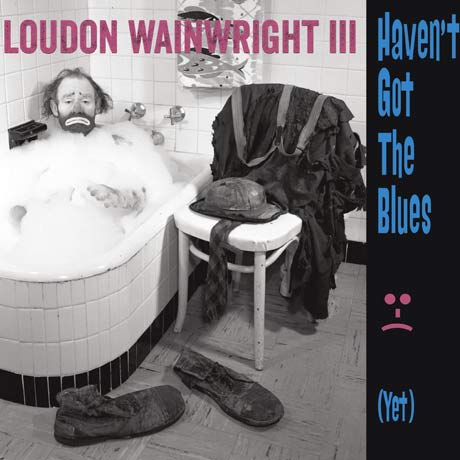Haven't Got the Blues (Yet) is the 26th album for Loudon Wainwright III, and his first since 2012. Along with having a varied topical focus, Wainwright worked with long-time collaborator David Mansfield and the results are, as Wainwright brags, "electric." The sweet-sour sounds of HGTB(Y) vary greatly in tone and attitude. Zoloft-induced lyrics about depression, drinking, dog shit and dodging parking enforcement are conveyed in such a seductive and simple manner that cover-to-cover listening is effortless. It is a rarity for an artist to be so confident and unapologetic about being a hot mess as Wainwright is on this album. That being said, the resulting poignancy of his honest songwriting is an amazing accomplishment.
Wainwright has the uncanny ability to meld his voice to the theme and tone of his music. Loudon's experience as a performer in multiple mediums is a distinct advantage for him, as he has an advantageous set of communicative skills that allow him to convey plenteous meaning in his lyrics. The gypsy polka styling of "Spaced," a song about the difficulties of parking, is enhanced by the ominous tone of Wainwright's delivery. Its menacing, sardonic approach is quickly contrasted by "Harmless," a song about aging and the subliminal futility of the human condition. Wainwright's stressing repetition of "Harmless" in the chorus begs a sympathetic ear.
Wainwright's well-profiled familial disputes are on honest display throughout the album. "I Knew Your Mother" is an unorthodox and charming address to his daughter about the separation of parents. The mandolin melody and light percussion provide the song with an upbeat air, but the lyrics are a despondent confession of broken love: the difficulties of being a father and the transformation of relationships, frankly rationalized with the lyrics "How long it lasted, is how long it could be." A similar airiness pervades the extremely dark, lounge-y, Michael Buble-styled "I'll be Killing You This Christmas." The song, a critique of the second amendment, is in reference to the terrible Newtown Massacre. Wainwright's satirical view of the event is so stark and absurd that it becomes more effective than any direct address could ever be.
Haven't Got the Blues (Yet) also, ironically, exhibits Wainwright's firm grasp of the blues. "God and Nature," with harmonious vocals and banjo, is perhaps the most swaggering song to ever continually reference biblical morality. Meanwhile, "The Depression Blues," with its slide guitar and seductive vocals, possesses a coolness that projects a metaphysical understanding of idioms and entendres. Wainwright's faith-questioning Pagliacci is not pacified by religion and decries their lack of answers for the blues, which he may or may not have yet.
(Proper)Wainwright has the uncanny ability to meld his voice to the theme and tone of his music. Loudon's experience as a performer in multiple mediums is a distinct advantage for him, as he has an advantageous set of communicative skills that allow him to convey plenteous meaning in his lyrics. The gypsy polka styling of "Spaced," a song about the difficulties of parking, is enhanced by the ominous tone of Wainwright's delivery. Its menacing, sardonic approach is quickly contrasted by "Harmless," a song about aging and the subliminal futility of the human condition. Wainwright's stressing repetition of "Harmless" in the chorus begs a sympathetic ear.
Wainwright's well-profiled familial disputes are on honest display throughout the album. "I Knew Your Mother" is an unorthodox and charming address to his daughter about the separation of parents. The mandolin melody and light percussion provide the song with an upbeat air, but the lyrics are a despondent confession of broken love: the difficulties of being a father and the transformation of relationships, frankly rationalized with the lyrics "How long it lasted, is how long it could be." A similar airiness pervades the extremely dark, lounge-y, Michael Buble-styled "I'll be Killing You This Christmas." The song, a critique of the second amendment, is in reference to the terrible Newtown Massacre. Wainwright's satirical view of the event is so stark and absurd that it becomes more effective than any direct address could ever be.
Haven't Got the Blues (Yet) also, ironically, exhibits Wainwright's firm grasp of the blues. "God and Nature," with harmonious vocals and banjo, is perhaps the most swaggering song to ever continually reference biblical morality. Meanwhile, "The Depression Blues," with its slide guitar and seductive vocals, possesses a coolness that projects a metaphysical understanding of idioms and entendres. Wainwright's faith-questioning Pagliacci is not pacified by religion and decries their lack of answers for the blues, which he may or may not have yet.
